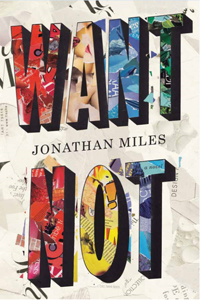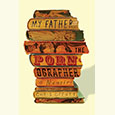We Are What We Bury
In his new novel, Want Not, Jonathan Miles digs through the garbage
Novelist Jonathan Miles can take the dreariest topics and turn them into humor. He demonstrated this Midas touch for comedy in his debut novel, Dear American Airlines, in which a sad-sack father, delayed at the airport en route to his daughter’s wedding, vents a lifetime’s worth of spleen in a self-lacerating diatribe so funny it masks the book’s philosophical gravity. In his second novel, Want Not, Miles raises the unpromising topic of uncontrollable human consumption. In less skilled hands, this book might read like a bludgeoning manifesto, but Miles has produced a droll and affecting tale of coming to terms with life’s inevitable waste.
 In Want Not, Miles paints on a wider canvas than he did with his debut novel, expanding his cast to include characters from across the socio-economic spectrum. He weaves together three different story lines, each of them set in greater New York City. The first involves Bertrand Talmadge and his girlfriend Micah, who open the novel thigh-deep in a Dumpster, rummaging for their evening meal. If forced to accept a label, they would call themselves “freegans.” Their trash-browsing lifestyle makes a political statement, as Micah explains: “Foraging is about refusing, on a totally personal level, to join in the overconsumption that’s just, just sucking the life from the planet. It’s about shunning commodity culture.”
In Want Not, Miles paints on a wider canvas than he did with his debut novel, expanding his cast to include characters from across the socio-economic spectrum. He weaves together three different story lines, each of them set in greater New York City. The first involves Bertrand Talmadge and his girlfriend Micah, who open the novel thigh-deep in a Dumpster, rummaging for their evening meal. If forced to accept a label, they would call themselves “freegans.” Their trash-browsing lifestyle makes a political statement, as Micah explains: “Foraging is about refusing, on a totally personal level, to join in the overconsumption that’s just, just sucking the life from the planet. It’s about shunning commodity culture.”
Across the Hudson and down the New Jersey Turnpike is Elwin Cross Jr., an applied linguist who specializes in preserving dying languages and whose own life is headed for the trash heap. His wife of two decades, Maura, has left him for a chef who “liberates” her in bed; at 340 pounds, Elwin is dangerously close to the “morbidly obese” classification; his beloved father, once a distinguished history professor, is struggling with Alzheimer’s; and, as the novel opens on a snowy November weekend, he has just struck and killed a deer. “How did I end up here?” Elwin continually asks himself. Amid this wreckage, he feels “piercingly alone, unloved and unheralded, a coroner of dead languages, dead marriages, and now (refocusing the mental lens) a dead and dangling deer.” He can’t answer the deeper questions, but he knows instinctively what to do next: take the deer home and preserve its meat so that it won’t have died pointlessly.
 Elwin’s effort to honor the deer’s dignity—and along the way, perhaps, regain a shred of his own—echoes in the third narrative. Sara Tetwick Masoli lost her husband Brian in the 9/11 attacks, but her grief lasted only until she stumbled across a cache of his emails to a lover. The devastation of discovering their torrid affair was more stunning than the attacks themselves. To Sara, learning about Brian’s betrayal “was like seeing the world turned inside out, and discovering that everything that you thought you knew about existence was backwards and upside down. That trees caused pollution and smoking makes you live longer and Santa Claus was real but also a well-known pederast.”
Elwin’s effort to honor the deer’s dignity—and along the way, perhaps, regain a shred of his own—echoes in the third narrative. Sara Tetwick Masoli lost her husband Brian in the 9/11 attacks, but her grief lasted only until she stumbled across a cache of his emails to a lover. The devastation of discovering their torrid affair was more stunning than the attacks themselves. To Sara, learning about Brian’s betrayal “was like seeing the world turned inside out, and discovering that everything that you thought you knew about existence was backwards and upside down. That trees caused pollution and smoking makes you live longer and Santa Claus was real but also a well-known pederast.”
Sara manages to begin anew, but she cannot shake the feeling that something is missing. She suspects she’s made a mistake in marrying Dave Masoli, who makes a good living collecting on dead credit debt that others in the “acquisition” industry have found too difficult to pursue. The secret to his success is not to listen to his targets’ stories, lest “some empathetic instinct” compromise his ability “to most efficiently convince them to pay money on a debt they had every liberty to ignore.”
Miles takes his time filling in the back stories for each of the main characters, including details of Elwin’s early field work with isolated South American tribes and Sara’s abortive acting career, which climaxed with a national television advertisement for deodorant soap. Micah at first comes across as unlikeable and strident, but her story comes alive when Miles describes her upbringing in the remote Tennessee hills by a father who believes that God told him to flee from the evils of the world. When Micah finally escapes his backwoods anti-consumerism, she finds that the beauty in the world is more than counter-balanced by its overwhelming hunger and desperation. Set against the millions living in abject poverty, the ungrateful Americans she sees eating Hamburger Helper with one hand and playing Atari with the other are not simply careless but pernicious.
For most of Want Not, Miles leaves implicit the connections among the three story lines, but the motif that links them is garbage. Elwin is invited by a government commission to contribute to a project exploring ways to dispose of radioactive waste, a material that will remain dangerous for 10,000 years, long after all the world’s current languages become obsolete. How then to communicate to future civilizations that they should stay away from the site? It’s a depressing assignment, Elwin acknowledges, considering that “this is the longest-range communication attempt we’ve ever undertaken,” and it’s all for “a big radioactive pile” of trash. Seeming to channel the Don DeLillo of Underworld, Elwin recognizes that this is not a new story: “Think about it. Not a single library survived antiquity. It’s just tombs and trash heaps. Historically, we are what we bury.”
Among this novel’s many pleasures is the way a passing observation can lead to a character’s personal revelation. Driving into Manhattan to visit his father, Elwin hears on the radio “a weird surfeit of Billy Joel songs, causing him to conclude that Billy Joel must have died … This saddened him, not because he liked Billy Joel—he didn’t—but because Maura did, and though their marriage was apparently over, he was still somehow conjoined with her, so that, imprisoned inside the Holland Tunnel, he felt the stab of her grief vicariously, as if some emotional satellite linkage had yet to be disabled.”
This elegantly crafted and consistently witty novel uses humor as an intellectual Trojan horse: while readers laugh at the book’s verbal invention and cringe at the all-too-human judgment errors of its characters, Miles sneaks in a provocative meditation on the ubiquity of material desire and the ruin that those appetites leave in their wakes.
Jonathan Miles will read from Want Not at Parnassus Books in Nashville on November 16, 2013, at 4 p.m.


